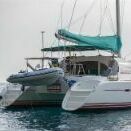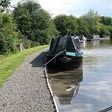

Teasel
Member-
Posts
69 -
Joined
-
Last visited
-
Days Won
1
Teasel last won the day on November 20 2016
Teasel had the most liked content!
Profile Information
-
Gender
Not Telling
Teasel's Achievements
Engager (3/12)
12
Reputation
-
Thanks Alan - yes - as I said I think residential boat groups would fall within the defined beneficiaries of this.
-
Hi All, There is funding from the Government available at the moment for people to explore community led housing options. 'Housing' obviously broadly defined to include residential boats. I think this could be well used for boaters who want to look at getting residential moorings etc.. It could support initial ideas and planning consultants, or other groundwork that might need doing. There is a need on the canals (in my view) for some new ideas, some more affordable residential moorings and some new solutions. The link is here - https://www.gov.uk/government/collections/community-housing-fund I may not be loads back to check on this post (or I may be) but i just wanted to make people aware it's available. Cheers.
-
Was this the '12-month plan' from 2014 Alan? Is it still current?
-
I think part of the issue has also been that BW didn't enforce the 14 day rule for a long time. Instead of enforcing that, they started bringing in guidance about cruising range etc.. the survey they put out in 2002 'Fair Play For All' did use the 'children in schools' issue as a way of differentiating between 'legitimate' and 'illegitimate' ccers, and led to the Draft Mooring Guidance (or similar named) with the 120 different lock miles every 3 months idea - very bad. The 2004 guidance was the first official 'interpretation' of the BW Act as far as I know. That was relaxed after the Davies case - to take out the 'progressive journey' bit. It's worth bearing in mind that the IWA existed 20 years before the BWB did, and have always favoured leisure boating over liveaboards. Just before the BW Bill in 1990 there was a report from the IWAAC which had submissions from IWA in it, and talked about 'unsightly, unhygienic' residential boats. The relationship between IWA and BWB is very long standing, and has had a direct impact on the legislation for the waterways - the '95 Act also provided a power for local authorities to help fund 'any person (or organisation) to restore waterways for amenity purposes, but despite the continuous use of the waterways by residential boats since the turn of the 18th century, liveaboards have been left out of the modern law and policy. There was provision for boat dwellers in social policy up until 1957, when they decided there was no point carrying on with it. I think a bit of foresight back then might have helped! Completely agree with this - CRT have explicitly acknowledged that their policy will affect people whose established lifestyles will be fundamentally threatened by it, and gone ahead regardless.
-
I'm not sure which way round it is actually. I get the impression CRT give a lot of weight to the views of the IWA and the RBOA
-
This is a quote from their policy on continuous cruisers: RBOA Chairman, Alan Wildman, submits that “Irrespective of the uncertainty emanating from the 1995 Act, continuous cruising should apply to boaters who have a primary intent to cruise extensively around the inland waterways. In most cases this will not be compatible with having lifestyle connections with one place – for example: education of children, employment or health needs. As Alan says, they don't represent most residential boaters either. You can find the whole thing here - https://www.rboa.org.uk/continuous-cruising-a-new-approach-from-the-rboa/
-
I think a co-ordinated boaters group would be a good idea at the moment, but the problem is that groups seem to have directly opposing interests at the moment - the RBOA and the IWA have both said that they want the 'range' required of continuous cruisers extended to up to something like 300 miles, and that they cannot see that having connections to one area can be compatible with the cc lifestyle etc.. Many ccers have kids in school or jobs.. The only way I can see that a group could represent all boaters would be to focus solely on maintenance and infrastructure- and stay out of all those political issues as far as possible. Although attention to those issues may well alleviate some of the political stuff in my view.
-
I might have got the 3rd licence category bit wrong actually - i had another look at the press release about it and it looks like it was the 'cherry picking' of eligible applicants and areas that was the problem. i'm not sure winter moorings are legal either. The roving mooring permits didn't produce a 'place' for s17(3)(c)(i) purposes though I don't think as there was no one place - if that worked then all cc's could also fall under that category.
-
A big problem with these on the K and A (one of several) was that they were only going to be available to established CCers in that area. Not to anyone else - it was a stated objective of the policy that it would 'phase out' the boat community there, and allow time for BW/CRT to introduce far more stringent rules that would stop anyone 'putting down roots' in future. I think a legal challenge to avoid being 'phased out' would have been justified. In the end, CRT's own legal advice said they couldn't do it.
-
The Judgment is here - https://www.whatdotheyknow.com/request/british_waterways_vs_davies for anyone who's interested and hasn't seen it - scroll to the bottom.
-
They were shot down by the law, actually. It was unlawful to introduce a third licence category outside of those stipulated in the '95 Act. Magictime said 'at least' and he's right - the law does require that. The other thing(s) to remember about the Davies case are that it was a County Court judgment - it's given way more weight than it's due. The judge also said that THIS defendant was not navigating in good faith, but made no judgment about anyone else - in fact, he specifically said that this judgment was not to be taken as endorsing the BWB's interpretation of s17, and that he could imagine a case in which a boater fell short of the guidance but was still within the terms of the law. The other thing is that there's no need to navigate for the sake of it, or because you enjoy it - if Davies had argued that he cruised for water on one day, bins a couple of weeks later, to get to some wood he'd left in the hedge after that etc etc.. it would have qualified as bfn. I think the balancing of home/navigation in that case was flawed. Navigation in good faith may well be incidental to use as a home.
-
no I don't think so? The 2015 Ts and Cs use the 2011 Guidance (updated in 2012 to reflect change of the name of the organisation only). You'll find it in both - the 2011 Guidance and the 2015 Ts and C's: 'what is required is that the boat is used for a genuine cruise'.
-
Effectively, yes. They changed 'around the network or at least a significant part of it' as it was too prescriptive (and blatant) but the interpretation of 'used bona fide for navigation' is essentially the same. If you read the various judgments CRT always do the thing with the meanings that I challenged Allan de Enfield on above - make it into one journey, not lots. That makes a difference for range and 'shuttling backwards and forwards' etc..
-
I think it's important. The 2004 Guidance, which interprets s17, said the law required 'a progressive journey around the network' and the 2011 guidance (now in force) says 'a genuine cruise'. The distinction is the difference between the law requiring the boat to be on one cruise, or used for many cruises. My interpretation of the law is that it requires the latter. CRT's, BWB's and some others seems to be the former.
-
I think so yes - the law doesn't say the boat has to be navigating throughout the period of the licence but that it has to be used for navigation throughout that period - there is a difference. I think my interpretation's along the same lines as magictime's above (although my cooking pot analogy may not have been very useful). As long as the boat's being used for navigation all year round (without stopping continuously in any one place for more than 14 days or such longer period is reasonable in the circumstances), there's no need for it to be continuously navigating. It seems like your interpretation is that the boat has to be navigating throughout - rather than it has to be used for navigation throughout..






